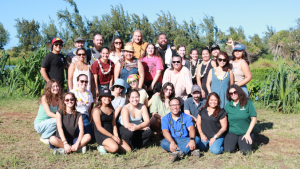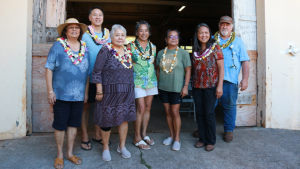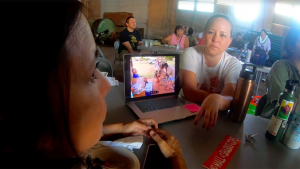
Like many communities in Hawaiʻi, Waialeʻe on Oʻahu’s North Shore has a rich cultural history full of moʻolelo (stories) and memories from kūpuna (elders) and ʻohana (families) who have called the area home for generations. Thanks to an oral history project by students in the University of Hawaiʻi at Mānoa Department of Ethnic Studies and Department of Anthropology, the moʻolelo of Waialeʻe’s kūpuna have been documented and will live on for generations to come.

“My mom was displaced when she was a child—she’s from Pūpūkea originally,” said UH Mānoa student Kenzie Kahale-Alexander, who worked on the project. “And so being able to hear stories of the area and kind of get an idea of maybe that’s what it was like for my family. That was kind of special. They took me in like family at the interview part and I’m just so fortunate to have met them and been able to work in this area.”
More than 20 students spent the fall 2023 semester documenting oral histories of nine Waialeʻe kūpuna as part of Ethnic Studies and Anthropology Professor Ty Kāwika Tengan’s North Shore Field School course. The students presented their final projects to the community at a hōʻike event on December 2, hosted in partnership with the North Shore Community Land Trust. The community organization was instrumental in forging partnerships with UH, providing connections to community and kūpuna, site access and hosting events.
“This is a really unique, important opportunity for students to do community-based work with both the Hawaiian community, as well as non-Hawaiian community members who have long standing ties to the place,” Tengan said. “We’re looking to instill in them an ethical sense, a kuleana-based approach to honoring the words of our narrators, the storytellers sharing their life experiences. It’s something that can only happen in a field school situation.”
“I’ve been with this project for almost two years now and I really love learning about the history of this place.” —Dani Kaohe David
Under the guidance of the Center for Oral History Director Mary Kunmi Yu Danico and Associate Director Micah Mizukami, the students conducted oral history interviews covering various topics with their narrators, including the Waialeʻe Training School for Boys, the UH Experimental Agricultural Station, kuleana land parcels and childhood memories of their upbringing in Waialeʻe. Additional support came from graduate student alakaʻi (leaders) Alana Kanahele, Dani Kaohe David, Naomi Doherty and Amber McClure.
“I’ve been with this project for almost two years now and I really love learning about the history of this place,” Kaohe David said. “I didn’t think I would as much as I do now. It makes me want to go back into my own community and research the places there.”

Danico added, “The celebration of our communities’ oral histories highlights the importance of how memories fill the gaps in our history. The Center for Oral History is honored to be part of this history in Waialeʻe!”
The kūpuna were Nohea Santimer, Leona Lui, Rachel Paris, Mildred Cataluna, Paul and Verna Eguires, Daniel Nahoopiʻi, Margaret Primacio and JennieLee Andrade.
“The students were great, made you feel comfortable and just their interests alone in what we had to say was pretty comforting, I guess, you know, because there was meaning to them for what we had to say,” Paul Eguires said.
Place-based service learning and scholarship

The project was funded in part by an award from the Provost’s Strategic Investment Initiative, a campus-wide competition designed to increase cross-unit and cross-disciplinary collaboration.
This course is a part of the Waialeʻe Lako Pono Provost’s Strategic Investment Initiative, a project that builds upon robust collaborations to develop Waialeʻe as a site of resurgent education, research and resilience for the North Shore community and beyond. The project was initiated by the North Shore Community Land Trust as part of the effort to restore environmental, agricultural and social abundance to Waialeʻe. The community group leases 30 acres from the UH‘s former Waialeʻe livestock research station to restore loʻi kalo, fishponds, agroforestry and habitat for native species.
“The Waialeʻe Lako Pono initiative that got funded by the provost was the effort of the university to fulfill that kuleana to listen to the people of the community to really take its role as a steward of the land seriously,” Tengan said. “All of these departments are coming together to have a holistic view of what it means to bring university faculty and students together to restore a place with the direction of the community.”
“Partnering with professors like Kumu Kāwika Tengan doing the oral history field school out here is really important to preserving the history of this side of the island.” —Kawela Farrant, the North Shore Community Land Trust
Cross-disciplinary programming will be created for Waialeʻe centers on place-based service learning and engaged scholarship. Waialeʻe demonstrates how UH can meet its kuleana to ʻāina through community-based and community-supported work. The initiative is a collaboration among the College of Social Sciences, School of Ocean and Earth Science and Technology, College of Tropical Agriculture and Human Resources, Hawaiʻinuiākea School of Hawaiian Knowledge, College of Engineering, School of Architecture, College of Arts, Languages & Letters and the North Shore Community Land Trust.
“A lot of things are changing out here on the North Shore and so partnering with professors like Kumu Kāwika Tengan doing the oral history field school out here is really important to preserving the history of this side of the island—remembering what makes this place special,” said Kawela Farrant from the North Shore Community Land Trust.

